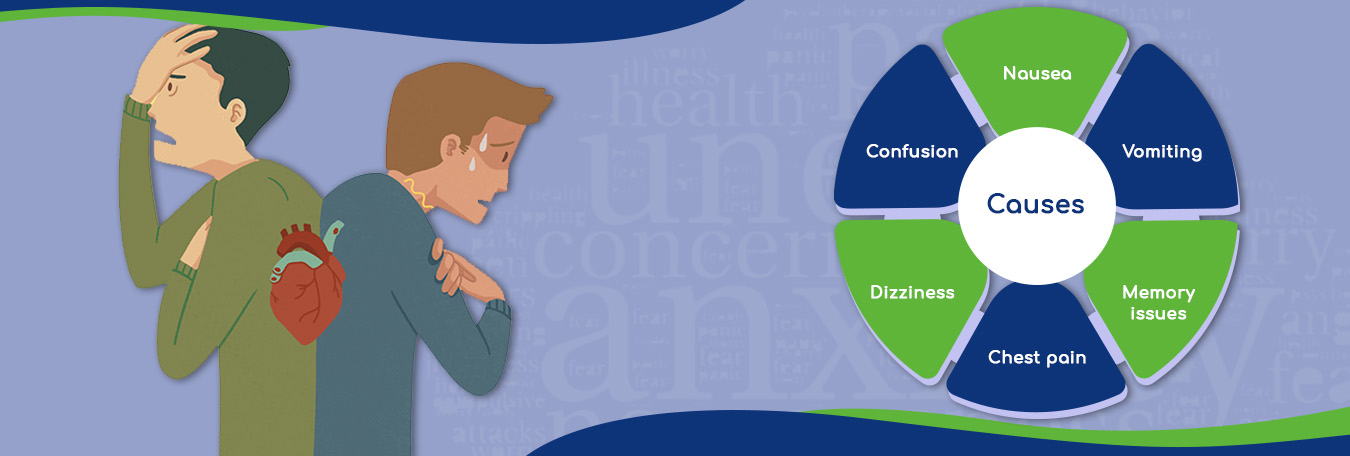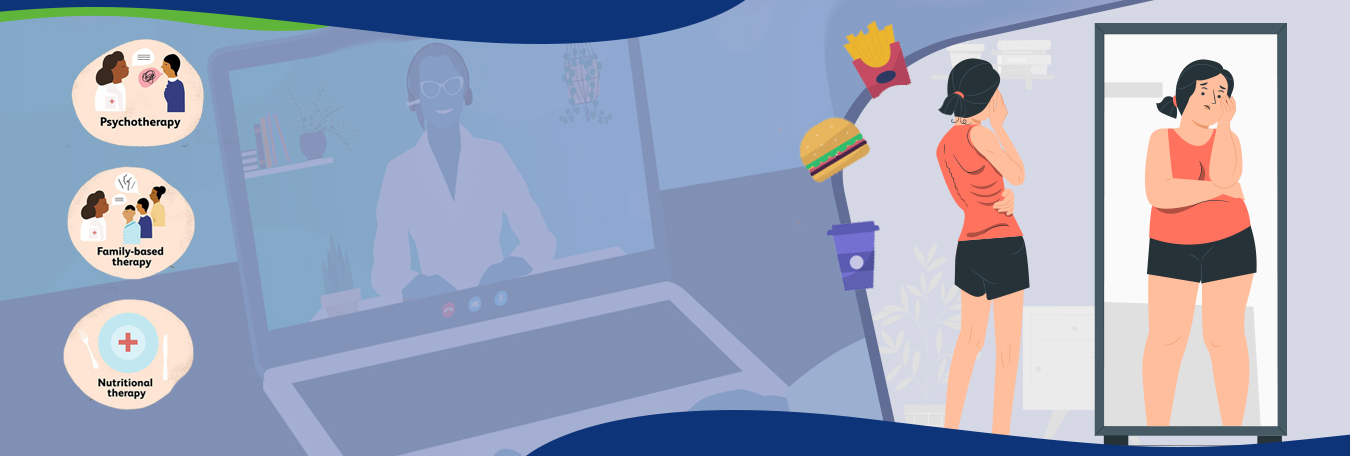PTSD: Symptoms, Causes, Diagnosis and Treatment
Are you experiencing anxiety, nightmares, or certain flashbacks? Are you facing difficulty in remembering things and paying attention to healthy life activities? If yes then you might be suffering from the post-traumatic stress disorder. Post-traumatic stress disorder is a common mental illness that distorts thought patterns and ultimately affects behavior. This disorder develops after the individual experiences any distressing situation. Instead of focusing on productive life activities, individuals remain indulged in their negative thought patterns and stay depressed.
So if you have ever experienced any frightening situation in the past then there is a greater possibility that you will suffer from this disorder. Individuals with post-traumatic stress disorder experience major physical and physiological abnormalities and are unable to spend a normal life. Initially, they remain normal with the onset of these disorder symptoms but with time, they can face trouble in each aspect of life. If the post-traumatic stress disorder symptoms are left untreated then they can experience the major post-traumatic effects.
Is PTSD a mental illness?
Post-traumatic stress disorder is a mental health problem that immediately develops after experiencing any stressful scenario or traumatic event. This mental condition was first identified in the veterans. Moreover, this disorder was renowned with different names but nowadays, this condition is majorly recognized with the name of post-traumatic stress disorder.
Individuals suffering from post-traumatic stress disorder remain traumatized. They feel a sense of danger for themselves and their loved ones. Not just a single factor is responsible for the development of this disorder. In most cases, some individuals exhibit a traumatic response even after indirect interaction with environmental stress. If any person is an eyewitness of any stressful situation then he can suffer from this disorder later in life.
What are the common PTSD symptoms?
Anyone who is dealing with post-traumatic syndrome can experience the below-mentioned symptoms:
- Sense of isolation
- Most often flashbacks
- Sense of harm or danger
- Difficulty in sleep
- Sudden mood alterations
- Emotional intensity
- Anger outburst
- Trouble in focus or concentration
- Talkative behavior
- Irritrabilty behvaior
- Reduced interest in physical activities
- Sense of embarrassment or shyness
- Frightening emotions and thoughts
- Headache
- Body ache
What are the symptoms of PTSD in children?
Although post-traumatic stress disorder affects both children and adults. However, children are more prone to this mental illness. Affected children don’t focus on their academic life. They feel reduced energy due to which they don’t actively participate in social activities. Moreover, they also face trouble in making bonds with theur friends or family.
Can a therapist diagnose post-traumatic stress disorder?
Yes, professional mental health therapists can identify the symptoms of post-traumatic stress disorder. At Inland Empire Behavioral Group, you can find highly professional and devoted therapists who specialize in the effective diagnosis of PTSD.
Various health conditions are identified with the presence of biological markers in the body. However, post-traumatic stress disorder does not have any biological markers. Therefore the post-traumatic stress disorder diagnosis is performed based on physical evaluation.
The PTSD diagnosis does not occur early as it is mostly recognized after a month. Before suggesting any medication or therapy, mental health experts first identify the mental condition and then devise the treatment plan. Different evaluation tests are conducted by the PTSD psychologist in which different questions are asked of the patients. Moreover, some questions are also asked regarding the medical history as well as the previous family history of the patients. If any individual is identified with some symptoms of post-traumatic stress disorder or getting diagnosed with PTSD, then they are guided further to employ any treatment plan.
Remember that the diagnosis is crucial so the therapist can develop the appropriate treatment plan according to the condition.
What are the causes of PTSD?
There is still no evidence that any single factor is responsible for causing PTSD. Different kinds of harsh experiences are responsible for the development of this disorder.
- Personal loss
- Financial loss
- Sexual abuse
- Domestic violence
- Death or loss of a loved one
- Sudden accidents
Elevated adrenaline levels
Different studies have reported that high levels of adrenaline are responsible for the onset of post-traumatic stress disorder in adults. During stressful situations, the body’s sympathetic system is activated which in turn stimulates the fight or flight response. After exposure to any traumatic situation, the body produces stress hormones in excess amounts.
Brain changes
Due to symptoms of post-traumatic stress disorder, different changes occur in the brain. The size of some brain regions gets altered including the hippocampus. Most of the individuals have reported the deceased brain size after the onset of post-traumatic stress disorder.
Learn more: PTSD in children: Causes, Diagnosis and Treatment
Which factors increase the likelihood of PTSD?
The onset of post-traumatic stress disorder symptoms is not limited to any specific gender and age. However, some factors increase the rate of occurrence of PTSD.
- Females are more prone to suffer from PTSD as compared to men.
- The presence of previous family history also elevates the rate of post-traumatic stress disorder onset.
Similarly, some other factors that have a major association with the development of PTSD include:
- Head injury or trauma
- Reduced attention from dear ones
- Sense of hopelessness
How to prevent the post-traumatic stress disorder?
There are some useful ways that you can use to prevent the symptoms of post-traumatic stress disorder. Individuals struggling with post-traumatic stress disorder always need support from loved ones to deal with any sudden traumatic situation. Even after that incident happens, the affected individual always requires continuous support and concern from the loved ones.
If your child is exhibiting a positive response then make a habit to praise them as you can. It will raise the confidence of your child in both academic and personal life.
What are the common types of post-traumatic stress disorder?
The most common types of post-traumatic stress disorder are as follows:
Uncomplicated disorder
As the name indicates, uncomplicated PTSD results from a single traumatic event. Moreover, individuals with uncomplicated disorder don’t experience other co-existing mental health conditions. Furthermore, individuals with uncomplicated disorder spend major time in their intrusive thoughts instead of focusing on productive life activities. However, this mental condition is not lethal but still can affect the quality of life if left untreated.
Complex PTSD
In this type, individuals experience different abuses in their childhood. In addition, the intensity of emotions associated with their thoughts is also incurred. Moreover, there is a major chance that they will experience major consequences in their life due to the severity of symptoms. According to different studies, it is estimated that most of the individuals suffering from complex post-traumatic stress disorder are more likely to experience an increased rate of hospitalization.
Furthermore, the daignosis of complex PTSD is quite difficult, and various individuals are unable to identify and deal with the complex PTSD effects on their lives.
How to differentiate PTSD from normal stress response?
Response to any stressful situation is quite normal. However, the normal stress response is quite different from the traumatic response in PTSD. Remember that if you are most often exhibiting the stress response then it’s an alarming situation that you are having the post-traumatic stress disorder. The most common symptoms of normal stress response include:
- Anger
- Fear or sadness
- Lack of concentration
- Sweating
- Shaking of hands
- Forgetfulness
- Fear of isolation or detachment
- Sleeping issues
How to treat the post-traumatic stress disorder?
The treatment of post-traumatic stress disorder involves the use of medications and psychotherapies.
Medications
Different medications are recommended by the experts for PTSD treatment. However, antianxiety medications, selective serotonin reuptake inhibitors, and antidepressants are widely recommended to treat the symptoms of this disorder. Moreover, some therapists recommend the medications with psychotherapy while on the other hand, some prefer the isolated use of medications.
Cognitive behavioral therapy
Cognitive behavioral therapy is a renowned psychotherapy that affects both cognitive and behavioral aspects of the individual. As individuals with post-traumatic stress disorder experience mental pain due to their emotional dysregulation, this therapy helps them regain their lost control over emotions. Talk therapists first identify the altered or frightening thought patterns and then guide the individuals that how to control their behavior. With professional assistance affected individuals learn how to cope with any distressing situation and associated later traumatic effects.
Trauma focused psychotherapy
As the name depicts, this therapy specifically focused on the trauma and its underlying effects. The therapist does not pay more attention to other cognitive or developmental issues. They only consider these factors that can cause post-traumatic stress disorder. With effective recognition, they guide the individuals that how to face any distressing situation and live a stress-free life. Individuals can better learn how to navigate the challenges associated with the traumatic event.
Group therapy
Individuals suffering from any traumatic situation have reduced confidence. They face trouble while sharing their mental health concerns with anyone. Therefore they feel comfort in the presence of others. During the group therapy sessions, they not only share their thoughts and experiences but also learn from each other.
Individual therapy
Those individuals who do not feel comfortable in the presence of other group members should choose individual therapy. While sitting alone with the therapist, they share their thoughts and underlying mental health issues. In individual therapy sessions, they get more courage in their discussion.
Can you recover from PTSD?
Absolutely yes! Any individual battling with post-traumatic stress disorder can recover with appropriate treatment. However, each individual has to experience different journies of recovery which comprise different stages such as:
The emergency stage
This is the initial stage that occurs after the individual experiences the trauma. During this phase, the impact of trauma can be observed on the individual, and the stress response is also generated. Individuals feel sudden shock and numbness after becoming the victim or eyewitness of a distressing situation. This phase involves the occurence of post-traumatic stress disorder symptoms. In addition, each individual responds differently during this phase. Individuals who have experienced this stage understand the importance of immediate professional help to prevent the adversity of further stress.
Rescue stage
The phase next to the emergency stage is the rescue stage. During this stage, individuals get directed on the journey of recovery from the post-traumatic stress disorder symptoms. Although the process of recovery is initiated individuals still face some symptoms which include stress, anxiety, aggression, mood swings as well as a sense of embarrassment and hopelessness.
Intermediate recovery stage
This phase involves the evident progress in the mental health condition of individua with PTSD. During this phase, individuals learn different coping mechanisms and employ them to reduce theur symptoms of post-traumatic stress disorder. Although the recovery is reliable it is slower and takes some time.
Reconstruction stage
The reconstruction stage is the ultimate stage of the recovery from post-traumatic stress disorder symptoms. During this phase, individuals experience significant recovery from this disorder. After becoming mentally active, they return to their life and enjoy every moment with absolute potential.
Last thoughts
Post-traumatic stress disorder is an anxiety disorder that develops after a traumatic incident. Individuals with this disorder have most often angry outbursts. Moreover, they face certain issues in focus or concentration. They are unable to live a stress-free life. Any physical, physiological loss or sudden incident can cause the development of post-traumatic stress disorder. However, at Inland Empire Behavioral group, you can find the best treatment plans for post-traumatic stress disorder. With our psychotherapy and medication management, you can smartly manage the symptoms of this disorder. So don’t wait any longer and take a step ahead to take advantage of our finest therapeutic strategies.

